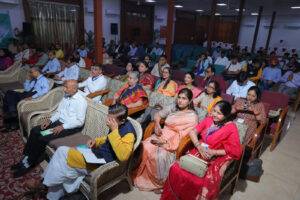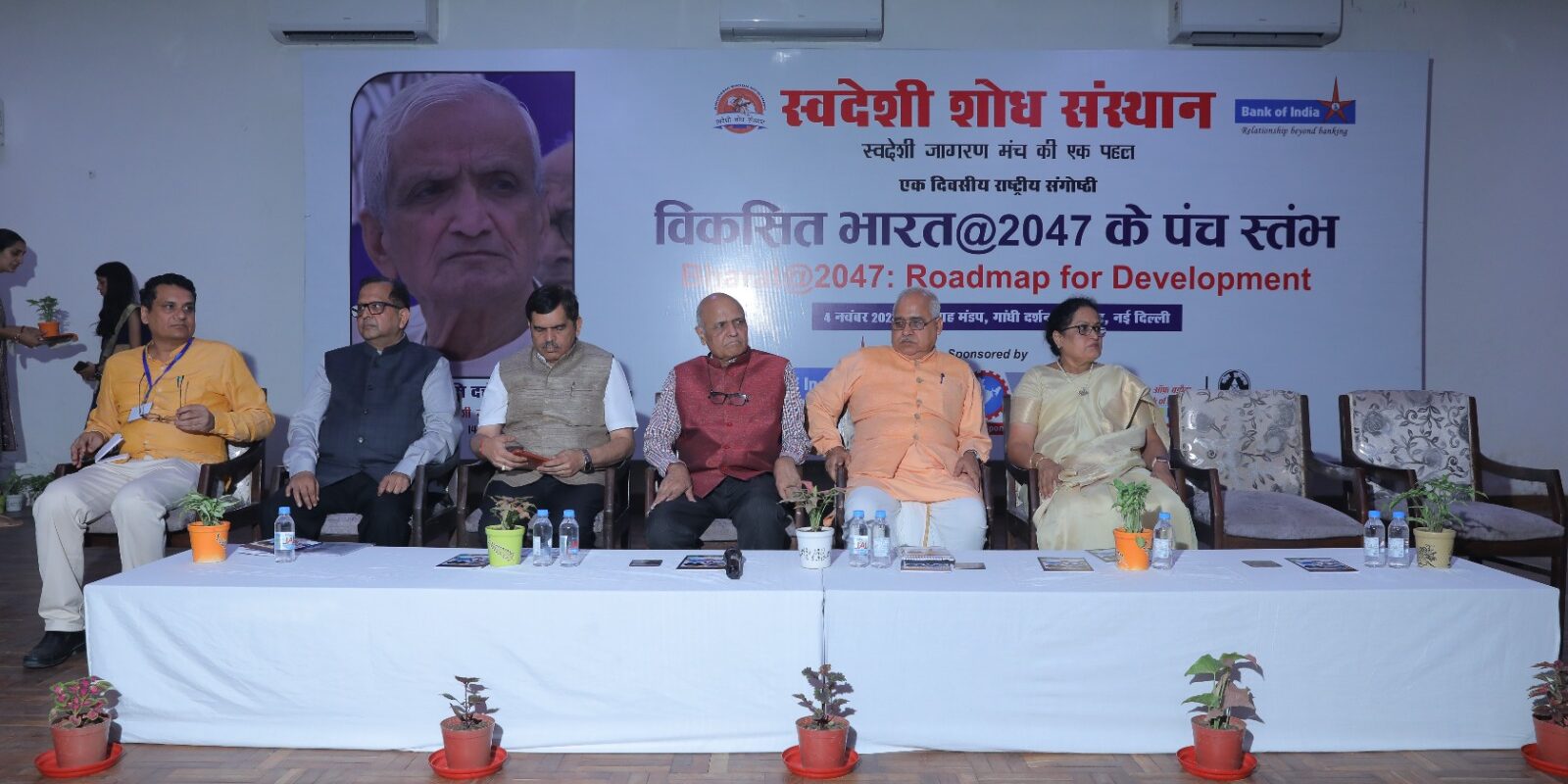Swadeshi Shodh Sansthan on the occasion of the birth anniversary of Rashtr Rishi Dattopant Thengadi ji, organized a one-day seminar on “विकवित भारत @2047 के पंच स्तंभ” on November 4, 2023 (Saturday), at Satyagrah Mandap, Gandhi Samriti & Darshan Smriti, New Delhi. The seminar focused on ‘Bharat@ 2047: Deliberating the Development Roadmap is a response to the vision of Prime Minister Modi for pushing India towards a growth path that ensures India’s transformation into a developed country by 2047. This seminar was sponsored by Bank of India, Bank of Baroda, Institution of Valuers and Coal India. The programme started at 11:00 AM with the welcome address by Prof. Pradeep S. Chauhan and Dr. Sarabjeet Kaur. The dignitaries on the dias were Padma Shri Shridhar Vembu (Online), Sh. Suresh Prabhu (Online), Prof. Bhagwati Prakash Sharma, Sh. Rajiv Kumar, Sh. R. Sundram, Sh. Vijay Goel, Prof. Shashikala Wanjari, Sh, Satish Kumar, Sh. Vinay Goel and Prof. Ashwani Mahajan.
Session-I
Inaguration
The inaugural session started at 11:15 AM where the chief guest was Padam Shri Sridhar Vembu, CEO of ZOHO corporation limited and chairman of advisory board of Swadeshi Shodh Sansthan, Sridhar talked about the capabilities of Indians and what they can achieve citing an example of UPI. According to him, Make in India products will surely boost the economy of India. He is very passionate about Indians being technologically selfreliance as a nation.
Shri R. Sundaram, Akhil Bhartiya Sanyojak, Swadeshi Jagran Manch said that India is the fastest growing economy and soon it will be the largest economy in the world. India has been society driven economy and it stands united whenever any challanges comes, future belongs to the Indian people and for a healthy economy we must use and promote local goods.
Shri Suresh Prabhu, Ex Minister, Govt. Of India, said that India is focusing for a long term sustainable growth, the numbers related to growth are not important but the quality of growth is important. Indian economy has been significantly growing and it will soon touch the sky. Shri Vinay Goel, General Secretary, Institution of Valuers emphasized on different parameters of valuation like role of ESG in valuation, approaches of Valuation. No valuation shall be possible without the help of technological developement. Shri Satish Kumar, Akhil Bhartiya Sah-Sangthak, Swadeshi Jagran Manch talked about a “SAMRIDHA BHARAT AND SASHAKT BHARAT”. Emphasizing the spread of entrepreneurship culture, with an aim to provide employement to all youths by 2030. The young entrepreneurs must focus on Swadeshi to unleash a profitable business from it.
Session- II
Demographic Trends Shaping Economic Growth
The second session of the seminar focused on Demographic Trends Shaping Economic Growth. Speakers of this session were Prof. Shashikala Wanjari, VC, National Institute of Educational Planning and Administration (NIEPA), New Delhi; Dr Rakesh Ranjan, Senior Consultant, Niti Aayog, Government of India and Prof. Ram Singh, Director, Delhi School of Economics, University of Delhi. The Indian economy has grown at an impressive rate in the post-COVID-19 years. An economy as large as this and growing rapidly cannot be characterized by weak domestic demand, particularly when external demand growth has been uneven and uncertain. One of the biggest challenges facing young Indians is employment. a large youth population can bring significant economic benefits as they represents a significant portion of the workforce and potential consumers. Furthermore, he said, a youthful population can also drive innovation and creativity, contributing to the growth and development of a country. Simultaneously, there are concerns about ensuring sufficient employment opportunities for such a large population and providing adequate education and training to equip them with the skills necessary for a rapidly changing global economy.
 Dr Rakesh Ranjan, focused on the implementation of various schemes for the skill development especially women. A huge population is an advantage only if we have enough jobs to convert a demographic fact into an economic opportunity. Further, abundant labour supply will fuel India’s near-term growth, but upskilling and the inclusion of women will be crucial in reaching the nation’s economic potential.
Dr Rakesh Ranjan, focused on the implementation of various schemes for the skill development especially women. A huge population is an advantage only if we have enough jobs to convert a demographic fact into an economic opportunity. Further, abundant labour supply will fuel India’s near-term growth, but upskilling and the inclusion of women will be crucial in reaching the nation’s economic potential.
Prof. Shashikala Wanjari said that India is the country of the youngsters. Only degree won’t help, we will have to think beyond that. Skill based courses can help in the development. There are the lateral opportunities that the students must go for to make themselves strong in terms of skills and knowledge.
Session: III
New Economic Paradigm for 2047: Deliberating Human Centric Development
The Speakers of this session were Sh. Shaurya Doval (Online), Founder and leader of India Foundation, Dr. Naveen Balli, Programme Lead, The Council’s Industrial Sustainability Ex-Principal Economic Adviser of India, Department of Economic Affairs, Ministry of Finance, Dr Ashwani Mahajan; National Co-Convenor of Swadeshi Jagran Manch and Sh. Bhagwati Prakash Sharma, Ex-VC, Gautam Budda University; Head, Swadeshi Shodh Sansthan. Sh. Shaurya Doval said the Indian economy has shown robust growth in the past one year, but it is not immune to the external pressures that affect a country’s growth. Further, instead of giving freebies, governments should concentrate more on targeted assistance and creating healthy economic competition amongst states to encourage development.
Prof. Ashwani Mahajan focused on private investment. He emphasised larger role for MSMEs (Micro, Small and Medium Enterprises). He also vehemently opposed crony capitalism as well as the government’s getting into businesses. On these principles, he opposed FDI in retail, media, insurance and other vital sectors along with disinvestment of public sector enterprises. Further, he said that after the pandemic, PM Modi officially adopted Dattopant’s vision of swadeshi, as the government’s motto of self-reliance.
Prof. Bhagwati Prakash Sharma said that being self-reliant is the need of the hour. Multinational companies are increasingly occupying India’s production. Giving the example of the solar sector, he said that at one time many Indian companies used to manufacture solar panels, which were exported to European countries. But, as soon as China started selling cheap solar panels in India, these companies of ours suffered. He said that every Indian should promote the use of indigenous products.
Dr. Naveen Balli said, progress is needed to increase employment opportunities, especially for young people, reduce informal employment and labour market inequality (particularly in terms of the gender pay gap), promote safe and secure working environments, and improve access to financial services to ensure sustained and inclusive economic growth.
Session-III
Security Paradigm for New Bharat
The panelists comprised of senior research analyst Dr. Rajiv Nayan from the Manohar Parrikar Institute of Defense, Sri. Aditya Raj Kaul who is Executive Editor at TV9 Network and a well-recognized expert on wars, propaganda, and narrative building, the third panelist was Dr. R K Tyagi who has extensive experience in defense manufacturing and worked as chairman of Hindustan Aeronautics Limited.
Dr.Nayan pitched for self-reliance in the defense sector and illustrated the example of defense purchasing by Bharat and China which reflected the rising height of Bharat in the international domain. One foreign defense manufacturer had sold variant MI which is better technology to Bharat than variant MC which it sold to China. Aditya Raj Kaul shared his experience of the role of propaganda in the war that is currently going on in Gaza and connected it with the experience of Kashmiris which happened during the 1990s.
Dr. R K Tyagi raised concerns about inadequate funding to the defense sector and suggested exploring opportunities for better funding to the defense sector. He talked about more teeth to the Chief of Defense Staff i.e. CDS, and more funding for indigenous research and development. He suggested monetizing the huge land pool owned by the defense in big cities and in lieu, the defense can get land at other places and this will not be burdensome to the taxpayer’s money. He also suggested to come up with an organization like Indian Defense Finance Corporation to raise money for the defense purpose. Currently, the defense is too dependent on the government for funding.
The audience raised concerns about whether it would be good to have a military power independent of government. Such a powerful military in other countries has led to a diminishing role of the democratically chosen government and administration by the military is risky.
Session IV
Science and Technology
The speakers of this session are Dr. Sapna Poti, Director Strategic Alliances, Office of the Principal Scientific Advisor to Govt. of India and Dr. Sanjeev Joshi, Deputy CEO BrahMos Aerospace and Technology Adviser to Secretary, DDR&D and Chairman DRDO.
Dr. Sapna addressed promoting scientific research and development and innovations by setting up centres of excellence, supporting Science and Technology Innovation Clusters for social impact and addressing industry problems through industry, multilateral agencies, startups etc. She addressed how Manthan platform is promoting collaboration between industry and scientific research and development ecosystem. This platform pillar is to provide opportunity creation that includes a call for early-stage innovation, market ready innovation, implementation projects, fellowships etc. She elaborated that they encourage people interested in science and technology to be part of entire supply side including grass root level innovators. Basically, Strategic Alliances role is to fix collaboration between demand and supply.
Dr. Sanjeev Joshi has led innovation project formulation and delivered management expertise that has led to the design and development of a wide range of teptical and strategic missile system. He addressed already initiated new projects to equip the Indian armed forces with latest generation and cutting edge technologies. He shared his views on the topic of bridging a new way for of managing innovation for societal impact.
Session-V
Strong and Self Reliant Bharat for a Peaceful World & Valedictory
The panelists of this session comprised of Sh. Gautam Chintamani, film historian and author and Sh. Shivshakti Bakshi, Executive Editor at Kamal Sandesh (BJP Mouthpiece). Sh. Gautam Chintamani talks how soft power works. He gave an example that the movie of Kabuliwala portrayed an image of Pathan as a fearless person and of integrity. India’s soft power in recent years has increased the interest in India and the declaration of International Day of Yoga is one such example. A Saudi girl was awarded Padam Shri for her contribution to Yoga. Steps like these changed the perception of common people of several countries towards India which reflects in the foreign policy of these countries
Sh. Shivshakti Bakshisaid said, the world is witnessing a ‘New and Self-reliant India’ emerging under the visionary and dynamic leadership of Prime Minister Shri Narendra Modi which is not only aware of its own responsibilities but keen to play a leading role on global issues. Further, India has been on the forefront on the issue of terrorism, international connectivity and taxation, climate change, reforms in UN institutions and world peace. Seminar ended with vote of thanks given by CA Shri Anil Sharma.






